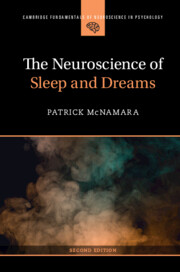Book contents
- The Neuroscience of Sleep and Dreams
- Cambridge Fundamentals of Neuroscience in Psychology
- The Neuroscience of Sleep and Dreams
- Copyright page
- Dedication
- Contents
- Figures
- Tables
- Preface
- Acknowledgments
- Chapter One What Is Sleep?
- Part I Sleep
- Part II Dreams
- Chapter Seven What Are Dreams?
- Chapter Eight Dreams across the Human Lifespan
- Chapter Nine Characteristics of REM and NREM Dreams
- Chapter Ten Dream Varieties
- Chapter Eleven Theories of Dreaming
- References
- Index
- References
Chapter Seven - What Are Dreams?
from Part II - Dreams
Published online by Cambridge University Press: 06 April 2023
- The Neuroscience of Sleep and Dreams
- Cambridge Fundamentals of Neuroscience in Psychology
- The Neuroscience of Sleep and Dreams
- Copyright page
- Dedication
- Contents
- Figures
- Tables
- Preface
- Acknowledgments
- Chapter One What Is Sleep?
- Part I Sleep
- Part II Dreams
- Chapter Seven What Are Dreams?
- Chapter Eight Dreams across the Human Lifespan
- Chapter Nine Characteristics of REM and NREM Dreams
- Chapter Ten Dream Varieties
- Chapter Eleven Theories of Dreaming
- References
- Index
- References
Summary
The most common definition of dreams among scientists appears to be that dreams are sleep-dependent cognitions (Table 7.1). They are thoughts and mental images that occur during sleep. If, however, dreams are sleep-dependent cognitions, then they require sleep if they are to occur. If REM sleep can erupt or invade daytime consciousness and REM-related mentation can occur with that daytime eruption, then we can get dreams or dreamy thoughts and images while awake. Indeed, that is what we call daydreams. Even if we cannot strictly claim that dreams are always sleep dependent, they nevertheless typically occur in association (even when daydreaming) with a brain state (REM) that is normally activated during sleep.
- Type
- Chapter
- Information
- The Neuroscience of Sleep and Dreams , pp. 129 - 143Publisher: Cambridge University PressPrint publication year: 2023

